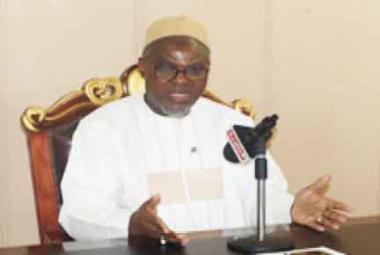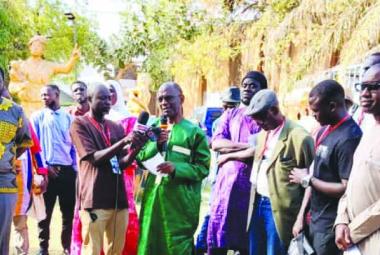Banjul, 24th February 2025: The Honourable Minister of Higher Education, Research, Science and Technology (MoHERST), Professor Pierre Gomez, last week presided over the validation of the first-ever national strategy for increased enrolment and participation of the female gender in tertiary and higher education and in decision making.
The validation brought together higher education stakeholders, who shared the findings of the survey that was conducted across tertiary and higher education institutions in the last quarter of 2024, and the strategy that was developed.
The consultancy exercise was part of the World Bank Resilience, Inclusive, Skills and Equity (RISE) Project.
In line with the consultancy, the validation forum was expected to provide the participants the opportunity to proffer insights from stakeholders and to confirm the accuracy of the survey findings.
In his keynote statement, the Honourable Minister of Higher Education, Research, Science and Technology, Professor Pierre Gomez described the occasion as a historic achievement for the tertiary and higher education sector.
Honourable Gomez noted that this is the first time, since the inception of the Ministry, that such a strategy is developed as an instrument to enhance access for women in tertiary and higher education, anddecision-making.
He revealed that The Gambia as a nation is still grappling with meeting its population’s tertiary and higher education needs, as 49% of Gambian women are still less likely to access tertiary and higher education, compared to their male counterparts. He noted this as a challenge for the government, and the tertiary and higher education sector. “Thus, the initiative of increasing the participation of females in our institutions of higher learning and male-dominated fields of study such as science, technology, engineering, mathematics, (STEM) and TVET, has been, and is still the priority of MoHERST. This goal is captured in the Ministry’s Institutional Strategy, as a strategic priority,” Prof Gomez stated.
The Tertiary and Higher Education minister also indicated that the validation of the strategy marked the beginning of possibilities for the female gender in terms of opportunities and access; thus, it is envisaged that when the strategies are implemented, the female gender will have the opportunity to access tertiary and higher education, especially in STEM.
The Deputy Permanent Secretary (Technical) at MOHERST, Mr. Mucktarr M. Y. Darboe, acknowledged that the development of the Strategy has been a collaborative effort, involving various stakeholders, including government ministries, civil society organisations, academic institutions, and development partners.
The Deputy Permanent Secretary for Administration and Finance of the Ministry, Ndey Fatou Trawally, highlighted that in The Gambia, and in many countries across Africa, the female gender has continually faced enormous challenges including, but not limited to financial resources; lack of motivation and adequate support from the home, school, and society; unfavorable societal norms and values; early marriage; and lack of role models for young females to emulate.
DPS Trawally added that the Ministry strongly hopes that the strategies that are being developed by the consultant will provide policy guide towards enhancing the situation of the female gender in the tertiary and higher education sector.
The consultant, Mrs. Emily Sarr, made a presentation on the findings of the survey and highlighted the barriers, challenges, and status of female participation in tertiary and higher education and in leadership. She also shared the strategies that she developed to address the above-mentioned barriers and challenges.
The event was chaired by the Ministry’s focal point for gender, Ms. Kumba Jammeh. She thanked the stakeholders who not only attended the validation workshop, but who participated in the survey. She called on development partners to work with the Ministry in the implementation of the Strategy, and thanked the World Bank for their partnership and support especially in the development of the Strategy.
By Fatoumata Joof
National Gender Strategy for Tertiary and Higher Education Sector Validated







